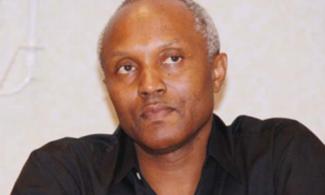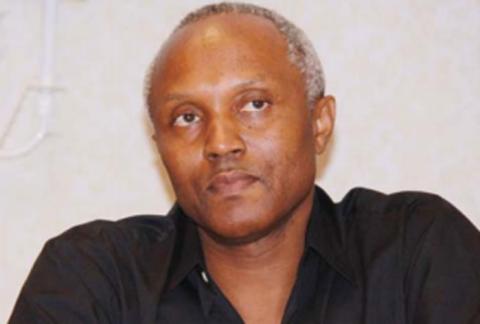
The dramatic rise in popularity of the so-called selfie—the self-taken photograph—strikes me as a symbolic way of understanding a dominant aspect of social behavior in the world. The selfie has, I suggest, further encouraged the inflation of the ego and spawned narcissistic attitudes. In making it chic to aim the lens of a camera at oneself, the selfie has helped to empower the cult of the self, even a form of self-worship.

Don’t get me wrong: I’m not a sourpuss out to scold people for cleaving to a fad. I’m interested in the craze at all only because I have recognized in it a metaphoric handle for explaining a particular malaise in Nigeria.
I have often argued that Nigeria is a form of peacock society, a society where the show-off is venerated. Anybody who attends a Nigerian party and sees the way people dress—men and women—would understand this aspect of social display. From the agbada that sweeps the floor to the gele (head wrap) that scrapes the sky, the scene at a Nigerian party often looks like a human attempt to recreate a gathering of peacocks. There’s the lushness of the Nigerian party scene, its unapologetic celebration of color, its unabashed air of gaudy exhibitionism, and the infectious gaiety of its atmosphere.
Depending on one’s taste, the Nigerian party scene can be resplendent or repellent. But it’s always visually fascinating. It’s as if the get-ups are in a contest, each determined to outshine the others.
This competitive spirit is present in other areas of Nigerian life. Years ago, on a visit to Nigeria, I ran into an old acquaintance on the streets of Lagos. I had known him in Enugu the year after I finished secondary school, and when he and I were junior level employees in a state ministry. In those days, he and I earned N100 per month. After paying rent and putting aside some money for transport to and from work, we had very little left. I remember how he and I often pooled money if we wanted to treat ourselves to roasted groundnut and banana.
Imagine my surprise, then, when I met this young man in Lagos and he was driving a brand new Pathfinder sports utility vehicle. It was his car, he assured me; he was eager to disabuse me of the impression he had borrowed it. And then he informed me that he owned three other cars. He was still single. When I expressed astonishment, he told me that four personal cars meant “nothing.” “There are other people like us who have 10, 15 personal cars,” he wanted me to know. His desire, he said, was to put money together to buy a fifth car, a Mercedes Benz, “for Christmas.”
As we talked, I got to know that the young man had not earned a degree from a university. Nor was it clear that he owned a profitable business. How, then, could he afford four cars—and aspire to buy a fifth? He’d joined the breed of youngsters who used a variety of scams to prey on the greed or gullibility of targets in Europe, North America, and elsewhere. That answer emerged when he attempted to sell me on forming a partnership with him. Since I lived in the US, he said, I should help him identify targets who had some money. He’d go after them with his “419” schemes, and we’d split whatever cash he was able to get. I said, thanks, but no. We parted in mutual incomprehension. I could not understand why somebody would do what he did in order to collect more cars than he needed; he, I suspect, could not fathom my disgust—much less my lack of interest in owning a variety of cars.
That encounter has struck me, lately, as providing a prism through which to illuminate certain compulsions in Nigeria. Why is it that too many Nigerian officials take to the predictable, sordid path of corruption? Why do too few public officials view their exalted offices as opportunities to make a significant difference in the fortunes of society? Why do the vast majority of public officials in Nigeria disdain the idea of legacy, the notion of acting as agents to make their environments better than they found it?
I think that a great deal of the answer is to be found in the craze of the selfie—an obsession with the self—and the preening, peacock sensibility that’s dominant in Nigeria. There’s no question: other societies are captivated by wealth and the wealthy. Some Americans go bunkers when they see a Hollywood star. Professional basketball players like Lebron James and Kevin Durant haul more than thirty million dollars for their ability to drop a ball through a hole. Even the communist leaders of China finally figured out that it would serve their country to enable aspects of capitalist investment and the attendant reaping of profit. (It’s to be noted, though, that the Chinese people are paying a huge price in environmental degradation for the gains of capitalist expansion).
However, I don’t know of another society where so many citizens, including ostensibly educated ones, are quite so complacent about the open, mindless looting of public funds by men and women who are addressed as “Your Excellency” or “Honorable This & That.” On the Internet, for example, a growing number of commentators can be counted on to defend, justify or rationalize every act of corruption, abuse of office, or sheer impunity by Nigerian officials.
I am a fairly attentive student of the ways in which language changes over time to express or accommodate equally changing social attitudes. In this regard, I find the Igbo phrase, “O na eme ofuma” (“He/She is doing well”) particularly intriguing. Years ago, that phrase was often used to make a moral judgment, to applaud a person for acting in a morally admirable manner.
In recent times, however, the phrase has come to denote—almost exclusively—that one has accumulated material wealth. I am disturbed that a phrase that used to specify and applaud excellent moral conduct has been hijacked and coopted to the service of lauding material enrichment. It’s even worse when one considers that the statement does not discriminate between wealth earned through honorable means and wealth that is illicitly acquired. Whether thief or entrepreneur, the same phrase applies.
It speaks to this evolving ethic of the individual, this apotheosis of the self, this sanctification of wealth as the ultimate, singular end. In order to serve this self-centered, money-based standard of achievement, too many Nigerians embrace the absurd. When former President Umaru Yar’Adua lay comatose in a Saudi hospital, his cohorts kept up the absurd impression that he was as fit as fiddle and providing dynamic leadership from his sick bed! The men and women who made that weird argument were not looking out for Nigeria; they were serving their pockets. They reeled in a lot of cash from that depraved enterprise. Yet, in a certain Nigerian parlance, they were “doing well.”
In October 2012, Governor Danbaba Suntai of Taraba State was seriously injured when a plane he piloted crash-landed at the Yola Airport. He has received treatment in three foreign countries, including the US, but anybody who sees or hears him can tell that he remains enfeebled. Yet, a small group of political operatives in the state are insisting that Mr. Suntai is ready to take on the challenge of running his state. It’s all part and parcel of this ethic of the self. It’s the kind of illogic that makes sense in a society where the selfie has met the peacock.
Please follow me on twitter @ okeyndibe